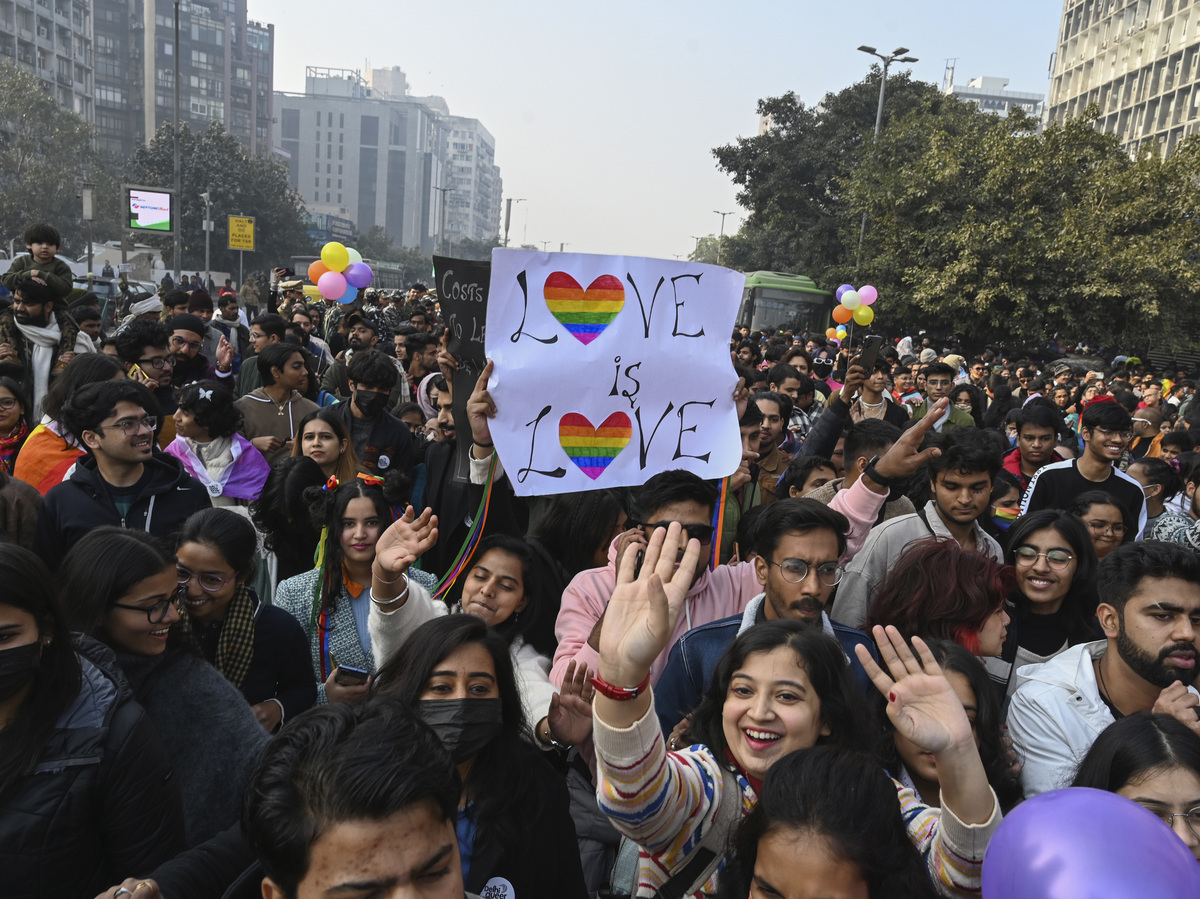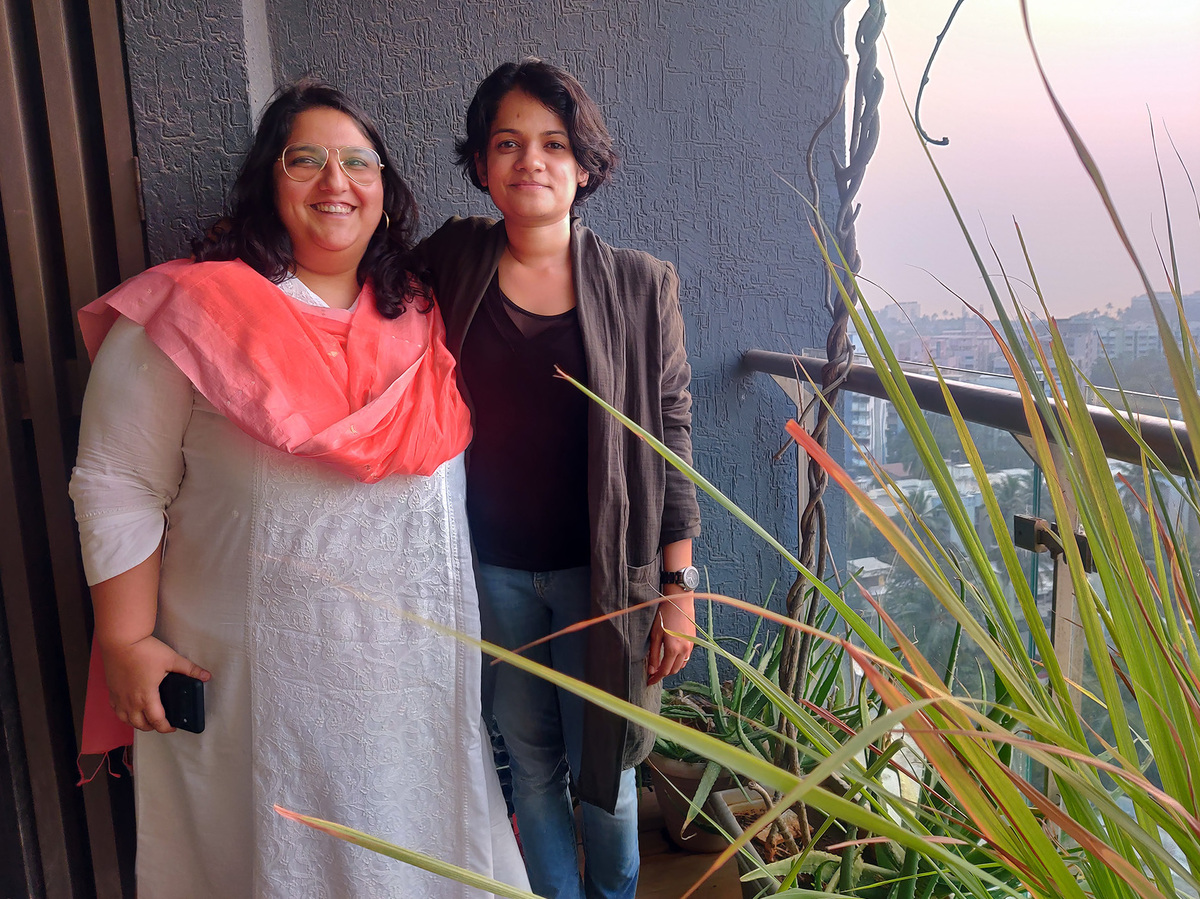[ad_1]

LGBTQ individuals and their supporters march demanding equal marriage rights in New Delhi, India, in January. India’s Supreme Court in 2018 struck down a colonial-era legislation that made homosexual intercourse punishable by as much as 10 years in jail however has but to legalize same-sex marriages.
AP
conceal caption
toggle caption
AP

LGBTQ individuals and their supporters march demanding equal marriage rights in New Delhi, India, in January. India’s Supreme Court in 2018 struck down a colonial-era legislation that made homosexual intercourse punishable by as much as 10 years in jail however has but to legalize same-sex marriages.
AP
MUMBAI — On a windy January night, Aditi Anand and her accomplice Susan Dias sit of their Mumbai house overlooking the ocean, reflecting on the life and household they’ve constructed collectively for 12 years. They have totally different personalities, hail from totally different social backgrounds and have totally different pursuits. “If we were not queer, we would never have met,” says 39-year-old Anand, who runs two movie manufacturing corporations.
They’ve pushed one another to reach their careers, are elevating a toddler collectively and can’t think about their lives with out one another. Their households are intertwined: Anand’s dad and mom and siblings depend on Dias for emotional help and Dias’ household leans on Anand, they are saying.
“Whatever fears I might have had coming out, I live a good life with my family, friends, colleagues, neighbors. There is nobody who doesn’t know about me,” says 35-year-old Dias, an entrepreneur who’s attempting to mass-market indigenous liquors from varied elements of India. “There is no nervousness.”
Anand and Dias are one among 4 LGBTQ {couples} petitioning India’s Supreme Court to legalize same-sex marriage. The Supreme Court accepted the petitions in January, and the Indian authorities was requested by the courtroom to place their case ahead in February. The courtroom will hear the matter on March 13. If same-sex marriage is legalized, it can have widespread repercussions for different Indian legal guidelines.

“Whatever fears I might have had coming out, I live a good life with my family, friends, colleagues, neighbors. There is nobody who doesn’t know about me,” says 35-year-old entrepreneur Susan Dias (proper), standing along with her accomplice Aditi Anand.
Raksha Kumar/NPR
conceal caption
toggle caption
Raksha Kumar/NPR

“Whatever fears I might have had coming out, I live a good life with my family, friends, colleagues, neighbors. There is nobody who doesn’t know about me,” says 35-year-old entrepreneur Susan Dias (proper), standing along with her accomplice Aditi Anand.
Raksha Kumar/NPR
India decriminalized homosexual intercourse 5 years in the past
Dias and Anand have been born in an India that held onto a British colonial-era legislation criminalizing homosexuality. After many years of grassroots activism and intense lobbying at coverage ranges, the Supreme Court decriminalized gay sex in 2018.
“I remember changing my Facebook display picture to one of Susan’s and mine that day,” says Anand.
Small acts like this say loads about freedoms one can train in a rustic like India, she says. Queer communities poured out into the streets, danced in entrance of the Supreme Court and held marches all through the nation flaunting pleasure colours and celebrating the decision.
The journey from there to in search of legalization of same-sex marriage has been quick.
Dias says she and her accomplice do every little thing that heterosexual {couples} do. They handle funds collectively, purchase property, increase youngsters. But they don’t have authorized safety as a pair, and that makes her really feel unequal amongst her friends. “And I feel the need to ask for [rights],” says Dias.
Anand’s causes are much less private. Ideals of democracy and equality have been handed down by means of generations in her household. Her grandfather was a newspaper editor who staunchly stood totally free expression.
“My grandfather had deep faith in Indian nation and Indian democracy,” she says.
Anand desires to barter her democratic rights with the state, remembering that her grandfather instructed her: “Every day you do that, democracy becomes dynamic.”
One overwhelming cause for the couple to strategy the courtroom is their toddler.
“There is no reason that our child should be denied the right to two parents,” says Anand. As it stands, the legislation acknowledges solely one among them as a authorized guardian.
Since the legislation in India solely acknowledges heterosexual marriages, youngsters of homosexual {couples} lose out on authorized recognition for each dad and mom. One could be legally acknowledged because the guardian of a kid both as a result of they gave delivery to the kid or as a result of they adopted the kid as a single guardian.
Indian legislation is predicated on a patriarchal idea of a household. The assumption is that the person is the breadwinner whereas the lady is restricted to family labor, says authorized scholar Akshat Agarwal.
“As soon as you recognize same-sex marriages, you reject that idea, right?” That is the crux of the difficulty, in accordance with Agarwal.
If the Supreme Court grants marriage equality for same-sex {couples}, it might imply an overhaul of many associated Indian legal guidelines. Laws governing divorce, alimony, inheritance and parenthood must be reimagined. It would be the largest change in a technology.
“Law often makes pronouncements before society has changed. And perhaps those can be used as tools for society to change,” he says.
A robust right-wing determine has expressed help for LGBTQ rights
Since there isn’t any authorized recognition of same-sex marriage, homosexual {couples} whose households threaten them with violence as a result of they’re against homosexual relationships don’t have any safety underneath the legislation. But excessive courts of various states in India have taken steps in addressing points regarding same-sex marriage.

Hindu nationalist Rashtriya Swayamsevak Sangh (RSS) chief Mohan Bhagwat affords prayers on the annual conventional truthful of Magh Mela in Prayagraj, India, in 2021. Earlier this yr, Bhagwat stated that homosexual individuals are part of Indian society and have the proper to dwell the best way they wish to.
Rajesh Kumar Singh/AP
conceal caption
toggle caption
Rajesh Kumar Singh/AP

Hindu nationalist Rashtriya Swayamsevak Sangh (RSS) chief Mohan Bhagwat affords prayers on the annual conventional truthful of Magh Mela in Prayagraj, India, in 2021. Earlier this yr, Bhagwat stated that homosexual individuals are part of Indian society and have the proper to dwell the best way they wish to.
Rajesh Kumar Singh/AP
In June 2022, the Kerala High Court ordered {that a} lesbian couple might dwell collectively, regardless of opposition from their households. In December 2021, the Uttarakhand High Court ordered a homosexual couple to be protected by the police. In November 2019, the Punjab and Haryana High Court ordered the police to guard a homosexual couple threatened by their households. In October 2018, the Kerala High Court stated {that a} lesbian couple was entitled to dwell collectively.
In January this yr, same-sex marriage proponents obtained help from somebody they least anticipated. Mohan Bhagwat, the pinnacle of essentially the most highly effective Hindu nationalist group, the Rashtriya Swayamsewak Sangh, stated in an interview that homosexual individuals are part of Indian society and have the proper to dwell the best way they wish to.
The RSS is an umbrella group that offers route to the ruling Hindu nationalist Bharatiya Janata Party. However, the central authorities, headed by Prime Minister Narendra Modi, is evident in its opposition to same-sex marriage.
A BJP lawmaker, Sushil Modi — no relation to the prime minister — told Parliament in December that same-sex marriage is a overseas idea, calling it opposite to the Indian ethos, Indian tradition and Indian custom.
If India legalizes same-sex marriage, it might be the 33rd country to take action.
And as they watch for a Supreme Court determination on marriage equality, Anand and Dias every have totally different goals about their huge fats Indian marriage ceremony.
“It is truly her dream that we are doing a choreographed dance,” says Dias, “and it is truly my nightmare.”
[adinserter block=”4″]
[ad_2]
Source link


